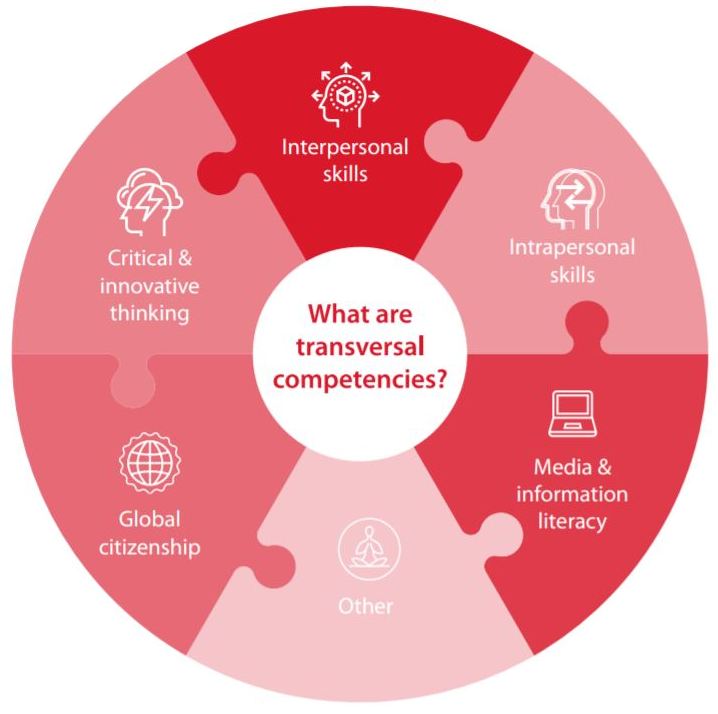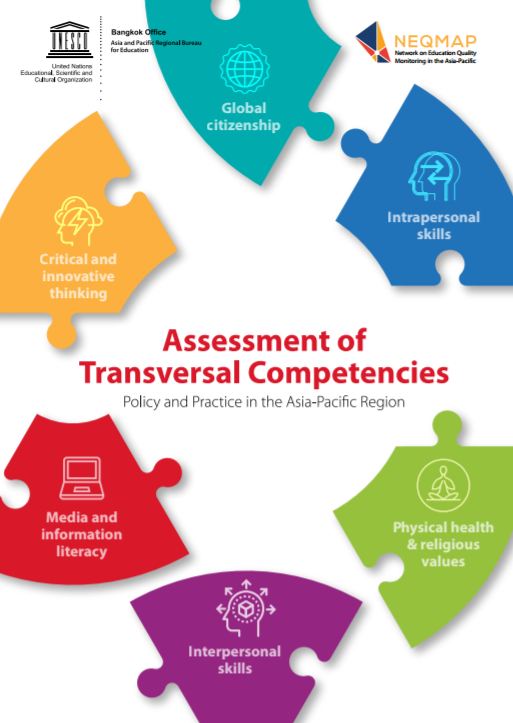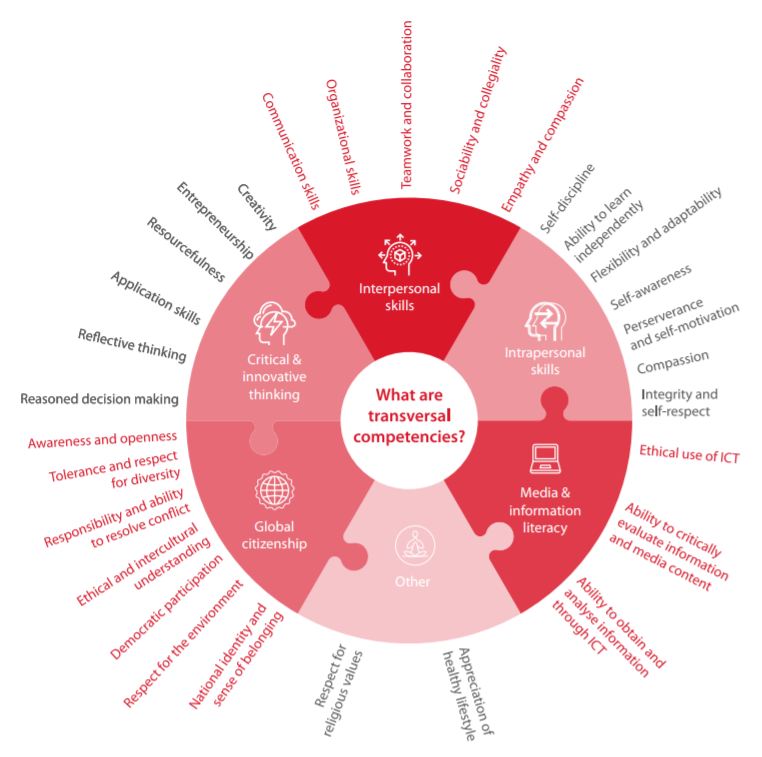Transversal Competencies and their Assessment: Perspectives from the Asia-Pacific by Ramya Vivekanandan
By Ramya Vivekanandan, UNESCO Bangkok.
 In today’s world, there is a growing sense that the real purpose of education is not only to produce learners who are literate and numerate. Instead, the complex times in which we live make additional, more crucial demands on our education systems: that they facilitate the holistic development of our young people such that they are creative, resourceful, self-disciplined, adept at collaborating with others, appreciative of diversity, able to resolve conflicts and contribute peacefully to democratic societies.
In today’s world, there is a growing sense that the real purpose of education is not only to produce learners who are literate and numerate. Instead, the complex times in which we live make additional, more crucial demands on our education systems: that they facilitate the holistic development of our young people such that they are creative, resourceful, self-disciplined, adept at collaborating with others, appreciative of diversity, able to resolve conflicts and contribute peacefully to democratic societies.
Some people refer to these as “21st century”, “transferable” or “socio-emotional” skills. Through ongoing research undertaken by the Education Research Institutes Network in the Asia-Pacific (ERI-Net), UNESCO’s Asia and Pacific Regional Bureau for Education (UNESCO Bangkok) adopted the term “transversal competencies” to refer to these skills and competencies, as per the following framework:
The idea that education should contribute to such outcomes is not new. What is notable now is the policy importance that countries across the socioeconomic spectrum have placed upon orienting their education systems to develop these competencies in their students. The idea is even enshrined in the Sustainable Development Goal 4/Education 2030 agenda, notably in its Target 4.7, which commits the international community to “By 2030, ensure that all learners acquire knowledge and skills needed to promote sustainable development, including, among others, through education for sustainable development and sustainable lifestyles, human rights, gender equality, promotion of a culture of peace and non-violence, global citizenship and appreciation of cultural diversity and of culture’s contribution to sustainable development.”
Through the ERI-Net research and other work, it has become clear that a number of countries have reflected the importance of the transversal competencies in their education policies and plans. Many have explicitly integrated the teaching of these areas in different areas of their national or local curricula, while others have worked to ensure that the initial preparation of teachers and their ongoing professional development include focus on these dimensions. What is less clear is the extent to which these competencies are or can be assessed. How can a teacher, for example, evaluate the degree to which a student is empathetic or compassionate? Can examinations and other “tests” actually measure abstract areas such as creativity or entrepreneurship, in ways that are valid and reliable? Are there successful examples of how this has been done?
UNESCO Bangkok, in its capacity as Secretariat of the Network on Education Quality Monitoring in the Asia-Pacific (NEQMAP), recently published Assessment of Transversal Competencies: Policy and Practice in the Asia-Pacific Region in the aim of understanding more about these questions and how some countries are trying to answer them.
NEQMAP is a regional network focused on supporting countries of the Asia-Pacific to strengthen their systems of student learning assessment. The network counts 41 members across 24 countries to date and focuses on research, knowledge sharing and capacity development. The study on assessment of transversal competencies was conducted under the auspices of NEQMAP and was authored by Dr. Esther Care of the Brookings Institution and Dr. Rebekah Luo of the University of Melbourne. It focused on the following four questions:
is a regional network focused on supporting countries of the Asia-Pacific to strengthen their systems of student learning assessment. The network counts 41 members across 24 countries to date and focuses on research, knowledge sharing and capacity development. The study on assessment of transversal competencies was conducted under the auspices of NEQMAP and was authored by Dr. Esther Care of the Brookings Institution and Dr. Rebekah Luo of the University of Melbourne. It focused on the following four questions:
- Is assessment of transversal competencies reflected in policies, plans, legislation, curriculum guidelines, or national assessment frameworks?
- Are transversal competencies being assessed at school and/or system level?
- What are the challenges of assessing transversal competencies at school?
- What are the recommendations for initiating or improving assessment of transversal competencies?
Focusing on nine countries/jurisdictions of the Asia-Pacific region (Australia, Hong Kong (China), India, Malaysia, Mongolia, Philippines, Republic of Korea, Thailand, Viet Nam), the study found that the assessment of transversal competencies is definitely being considered by policymakers across the countries. Some have explored how such assessment can be concretely implemented but have faced a number of challenges, including integration of transversal competencies in curriculum and teaching in general, unclear guidance as to how to operationalize systematic vision about assessing these areas at the school level and lack of professional development and support for teachers to guide them in this process. There is also a dearth of knowledge of and access to appropriate assessment tools in regard to these domains.
The nine case studies revealed a great deal of diversity across the region but common calls for more professional development and the development of tools for the assessment of transversal competencies. UNESCO Bangkok, through NEQMAP, will continue to work in this area and explore the topic, focusing a next phase of research on a more concrete understanding of how schools and education systems can assess competencies such as integrity, respect for the environment, civic participation and the other areas which are so crucial for today’s young people to master.
How does your country or organization approach the assessment of transversal competencies in education? Please share with us notable practices and innovations in this area!
Ramya Vivekanandan is Programme Specialist and leader of the team on Quality of Education at UNESCO Bangkok. In this capacity, she also serves as Head of the NEQMAP Secretariat. She can be reached at r(dot)vivekanandan(at)unesco(dot)org.
>> View all NORRAG Blogs on Learning Assessments
NORRAG (Network for International Policies and Cooperation in Education and Training) is an internationally recognised, multi-stakeholder network which has been seeking to inform, challenge and influence international education and training policies and cooperation for almost 30 years. NORRAG has more than 4,700 registered members worldwide and is free to join. Not a member? Join free here.

